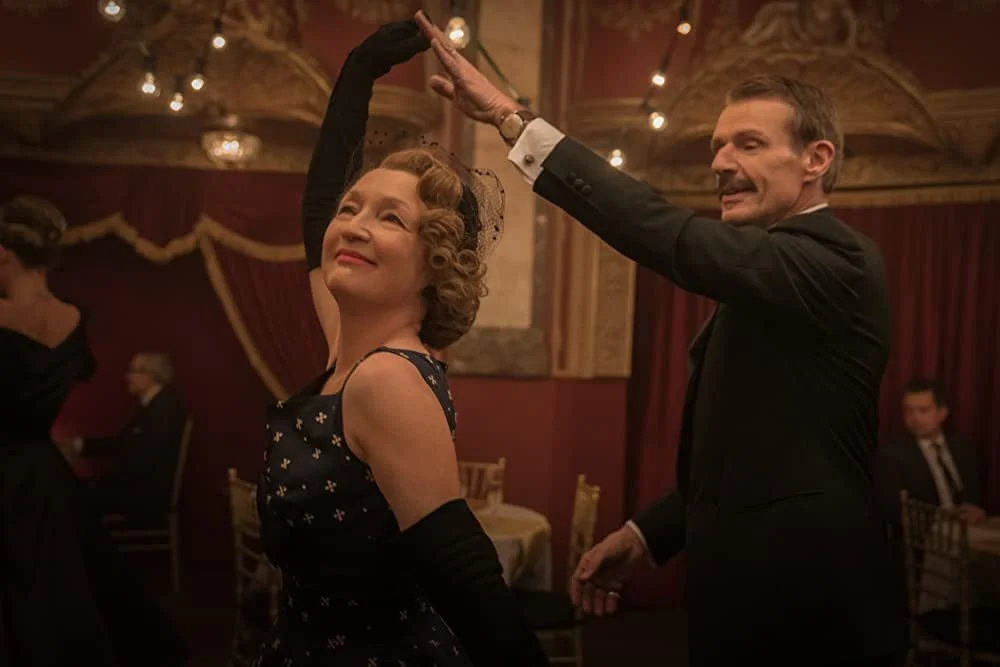MRS. HARRIS GOES TO PARIS
Directing: B
Acting: B+
Writing: B-
Cinematography: B
Editing: B
Costume Design: B+
Mrs. Harris Goes to Paris is a harmless diversion, if slightly rushing through its plot points, and just superficial enough to serve as blandly pleasant entertainment that is not much in the way of intellectual stimulation. I’m starting right off by coming close to backhanded compliments, but movies like this have their place and have their audience; it had its place for a couple of hours in front of my own face, after all. That said, I did think this film was a little too enamored with its own cuteness, with several diversions into overtly contrived speeches and dialogue.
All that said, if there is any reason to see Mrs. Harris Goes to Paris, it is absolutely Lesley Manville, doing a stellar job in the title role as a London cleaning lady with dreams of buying a £500 dress. And even though the characters ironically speak about how fairy tales aren’t real and this is “the real world,” Mrs. Harris’s entire story here plays very much like a fairy tale, what with her coming into surprising amounts of money from multiple sources all at once, giving her barely enough money to realize her dream of traveling to Paris and going to the Chrisian Dior fashion house to buy an expensive, custom tailored dress.
Mrs. Harris somehow quite easily stumbles into the Chrisian Dior space, after leaving the airport on foot, befriending a few sweet homeless men (did she get all the way into town on foot?), and finding her way there after getting some simple directions. When the fashion house manager, an elitist woman (but of course, spoiler alert, also with a heart of gold) played by Isabelle Hupert, tries to convince Mrs. Harris she really belongs in a department store, all the models and seamstresses are immediately charmed by her.
There’s a somewhat odd dichotomy of themes here, with director and co-writer Anthony Fabian weaving in a persistent subtext of classism, while somehow completely ignoring racism—in the real real world, you can hardly have a society with one without the other. Yet in this particular fairy tale, it seems to be a sort of racial utopia, with Mrs. Harris’s best friend being a Black woman who is also a cleaning lady (played charmingly, I might add, by Ellen Thomas); and a majority of the Dior fashion models being beautiful women of color. There is likely a historical element of exoticism going on here, but that is never commented on or acknowledged; rather, it is presented more as a period detail. It should also be noted that this is supposed to be the Paris of 1957, which was presumably more “progressive” than the U.S., but you would never know in what ways or to what true degree by watching this film.
Nevertheless, I did find myself engaged by Manville’s performance in particular, and am not sure I would have enjoyed the movie even this much had someone else, a lesser performer, been cast in the role. The last time Manville turned heads in a major role was as Daniel Day-Lewis’s designer sister in the wonderful 2018 film Phantom Thread, which also happened to be set in the world of fashion. Her characters in these two films are diametrical opposites, and watching her in these two movies alone might constitute a masterclass in acting. The earlier film is far more serious, far more nuanced, and far more challenging, but those are often more my cup of tea.
Mrs. Harris Goes to Paris will still be plenty of people’s cup of tea, and for a couple of hours it was even mine too; it’s just not my favorite tea. Not the most flavorful. I like something with slightly more of a kick. This film is largely superficial in its themes, gleaning over what might have benefited from more depth. But, sometimes you just want to escape into a movie about a woman in love with beautiful dresses, and this film does a perfectly good job of quenching that thirst.
Take a swirl though Mrs. Harris’s broadening world.
Overall: B

